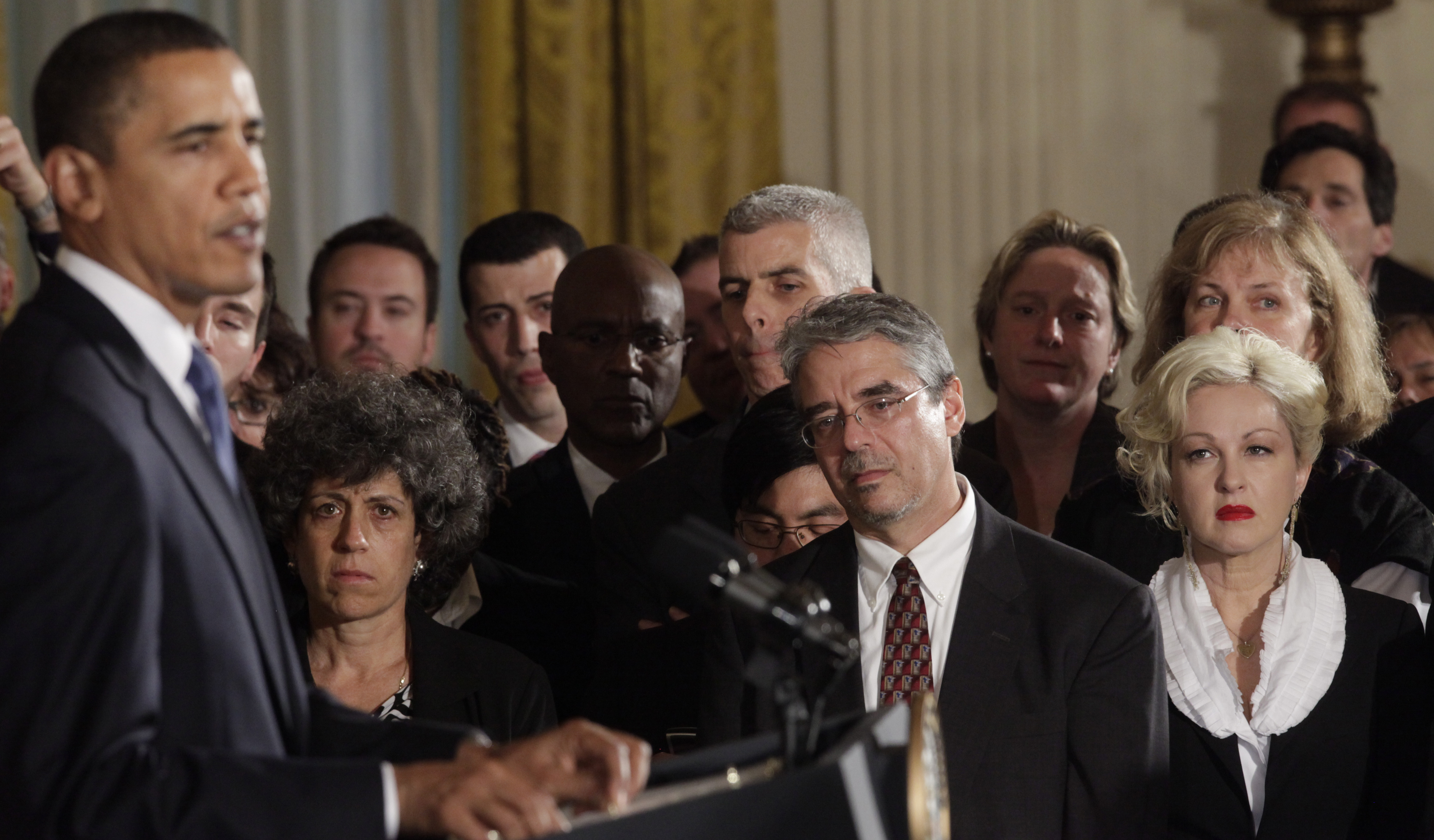- Laws named after people are often created so they can protect others.
- The most recent federal law to be named after a person was signed into existence in February.
- The murders of Matthew Shepard and James Byrd Jr. created a law to raise the penalties for all hate crimes.
- Adam Walsh’s abduction led to increased funding for sex offender management.
Many federal laws are named after the people whose stories or situations inspired them. In many cases, a harrowing incident led to individuals, family members, and communities rallying and campaigning for laws that could make the US a safer place.
Here’s the story behind the creation of 10 laws that were named after people.
Ryan White inspired a bipartisan law to help people affected by HIV and AIDS.

Ryan White was 13 years old when he received a blood transfusion for his hemophilia that was contaminated with HIV in 1984. Diagnosed with the Human Immunodeficiency Virus, White was told by the superintendent in the district that he would not be able to return to school. White faced AIDS-related discrimination from other students, school officials, and people in his town in Indiana.
White and his family advocated against the stigma of the disease and for blood donations to be tested for HIV. President George H.W. Bush later signed “The Ryan White CARE Act” into legislation in 1990 (the same year as White’s death), providing the country with assistance for comprehensive cost-efficient diagnosing and treatment services for communities disproportionately affected by the HIV epidemic.
Read More: 6 common myths about HIV and AIDS
Brady's Law impacted how firearms are sold.

In 1981, an attempted assassination of President Ronald Reagan by John Hinckley Jr. resulted in the injury of four people, including the president and then-press secretary James S. Brady (who survived despite being shot in the head). Authorities discovered that Hinckley Jr. bought multiple guns in the years leading up to the shooting.
The Brady Handgun Violence Prevention Act of 1993 or Brady's Law lead to the establishment of the National Instant Criminal Background Check System (NICS) that all licensees must contact before selling a firearm to an unlicensed individual unless the state has alternative provisions and permits in place.
The formation of sex registries was created in 1994 as part of Jacob Wetterling's law.

Jacob Wetterling was just 11 years old when he was abducted and murdered in 1989. His killer wasn't identified until 2016 when he was in custody for child pornography charges.
As one of many young boys sexually assaulted in that area from 1988-1989, the publicity of his case helped legislators choose his name for the law. As part of the Federal Violent Crime Control and Law Enforcement Act of 1994, the Wetterling Act required states to create sex offender registries, add a heightened class for "sexually violent predators," require address verification, and provide procedures to protect the public.
Pam Lychner helped enact the Pam Lychner Sexual Offender Tracking and Identification Act of 1996.

Pam Lychner was a real estate agent who was showing a Houston home when a man looking at the house sexually assaulted her. Her husband arrived and confronted the attacker, who was later revealed to be a twice-convicted sex offender.
Her attacker was sentenced to 20 years in prison but was up for parole in two years. When Lychner was notified about the parole hearing, she contacted the City of Houston's Victims' Assistance Office where, through connections with victims of gun violence, she formed Justice for All to advocate against violent crime.
She worked to amend the Wetterling Act to enact the Pam Lychner Sexual Offender Tracking and Identification Act of 1996 which established a national database at the FBI to track sexually violent predators and increase "the duration of state registration requirement from 10 years to 10 years or life, depending on the number of prior convictions and the type of crime committed."
Megan's Law was introduced to help parents identify sex offenders living in their neighborhoods.

In 1994, 7-year-old Megan Kanka from New Jersey was raped and killed by a known registered sex offender who had moved into the house across the street from her family. The family hadn't been notified or informed that they'd been living across the street from a registered sex offender.
After her death, the Kankas fought to have a law in place that would warn communities about sex offenders living in their neighborhood. Former President Bill Clinton signed the legislation into law in 1996 that stated all states were required to establish sex offender registries and establish community notification.
States have since adopted different ways of carrying out Megan's Law.
Amber Alerts are named after Amber Hagerman.

In 1996, 9-year-old Amber Hagerman was kidnapped while riding her bicycle in Arlington, Texas, and was brutally murdered. A mother in the area, Diana Simone, who had been following the publicized case, called the radio station asking if alerts could go out for missing children the way they did from the National Weather System.
Dallas-Fort Worth broadcasters and local police took the idea to develop an "early warning system" to help find missing children. Other states began to create similar alliances, and in 2003, President Bush signed the PROTECT Act to give grants to states to set up similar systems, now known as Amber Alerts, in all 50 states.
Muhammad Ali's name is attributed to the 2000 Boxing Reform Act.

The Muhammad Ali Boxing Reform Act, or the Ali Act, was introduced in 1999 to protect boxers' rights. It amended the Professional Boxing Safety Act of 1996, to specify that a "sanctioning organization may not receive any compensation from a boxing match unless it files its bylaws and a complete description of its rating criteria, policies, and general sanctioning fee schedule with the FTC," making the flow of money more transparent.
Before the Ali Act, financial power lay in the hands of promoters. And the Ali Act is currently under review to possibly expand to MMA fighting. "The UFC only discloses [financial] information to athletes who have negotiated a percentage of pay-per-view revenue into their contracts," so according to ESPN, expanding the act could make MMA fighters more informed during contract negotiations.
Adam Walsh's abduction led to increased funding for sex offender management.

On July 27, 1981, 6-year-old Adam Walsh was abducted in Hollywood, Florida. Three months later, some of his remains were found. Adam's parents became leading victims' rights activists and they fought for the passage of the Adam Walsh Child Protection and Safety Act of 2006, which significantly strengthened notification laws by increasing durations of sex offender status, increasing funding, and increasing penalties.
It also expanded the definition to include 212 federally recognized Native American tribes and established a sect for managing sex offenders in the Department of Justice. Adam's parents John and Revé Walsh stood beside President George W. Bush as this law was signed into existence.
The murders of Matthew Shepard and James Byrd Jr. helped to inspire a law to raise the penalties for all hate crimes.

In 1998, openly gay college student Matthew Shepard was tied to a fence and violently assaulted by two men in Laramie, Wyoming. Shepard died of brain trauma days later. The two men were sentenced to prison for murder, but could not be charged with a hate crime because "sexual orientation" was not included under the law at the time. That same year, James Byrd, Jr., a black father of three, was lynched by three white men. His family worked with Shephard's to increase the penalties for hate crimes.
The 1968 federal hate crimes statute made it a crime to "use, or threaten to use, force to willfully interfere with any person because of race, color, religion, or national origin." In 2009, The Matthew Shepard and James Byrd, Jr., Hate Crimes Prevention Act expanded the original to include crimes based on the victim's sexual orientation, gender identity, or disability. The act also provides funding and assistance to states to help investigate, prevent, and prosecute hate crimes.
Kari's Law was signed into office in 2018 to make it easier to make emergency calls from hotel rooms.

Kari Hunt Dunn was stabbed to death by her estranged husband in a hotel room in 2013 in Texas while her three children watched. Her 9-year-old daughter knew to call 911, however, she tried four times and couldn't get through. As it turns out, she wasn't aware of the then-common practice of dialing "9" before making a call outside of the hotel.
In 2015, Kari's parents helped introduce a Texas bill that required that systems like hotels and businesses no longer use the prefix in order to call 911. In 2018, Kari's Law was signed into US Federal Law.
Visit INSIDER's homepage for more.

